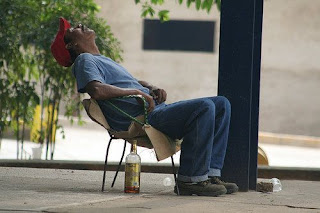Travelling through Guatemala has involved a constant battle with busboys in a vain attempt to pay a fare approximating what locals wouldcough up. (As Marcelle said, If I hear one more person say the price has gone up because of fuel prices I will hit them over the head - expats -
gotta love 'em) Most trips I know I am getting ripped off but I can't be bothered bargaining, I try and see what others are paying, or ask, but most locals don't know because they rarely go the full distance of a bus ride. So I just sit out the trip, watching what others are charged to confirm my I have been ripped off feelings, being a passive aggressive, letting the internal resentment boil away. In Honduras they are a step ahead of Guatemala - I still got ripped off, but I was also given a chit of paper showing how much I had paid. Thus the amount I was ripped off was clearly evidenced in writing. As you get off the bus you hand in your chit of paper, so it can be used all over again for the same purpose !
Anyway, all this got me thinking about a conversation I had with a chicken shop rotisserie repair man who picked me up when I was hitching in El Salvador and a movie I saw about gangs in Central America made up men deported from the US. In the 1980's hundreds of thousands of people fled Central American countries to the US to escape the series of wars that rippled through the various countries. Most entered the US illegally, and thus when the wars came to an end, immigration authorities had even less qualms about deporting people back to the post
war hell holes that most of the central American countries were. In the front-line of these deportations were young men who came in to contact with the long arm of the law, many who were members of gangs which had been set up to protect them from the resentment and rejection they faced daily from Americans. Many of these gang members spoke little or no
Spanish, as they had grown up in the US, had little or no family in their country of birth, and had very few work skills in a market that was rampant with unemployment. Also, gang membership often required tattooing large parts of their bodies as a sign of loyalty, hence they were easily identifiable. Returning to countries which were largely lawless and filled with guns, gang members set up local chapters, and got heavily involved in the drug trade and other violent, illicit activities - assisting in creating high levels of violence and a general sense of a lack of safety in the streets. Governments soon cracked down on this, creating even more violence and oppression. The documentary I had seen was about some small attempts, by USAID backed NGOs, to assist former gang members escape the cycle of gang membership, and involvement
in crime. Needless to say, most attempts were half-arsed to begin with, and had little success, but it was interesting to hear former gang members talk about their life in gangs, and trying to escape the cycle which constantly required them to kill opposing gangs' members in endless turf warfare. Those who were trying to escape the cycle had a tough time, rejected and threatened by both their former gangs' members and by society at large - constantly harassed by police and
discriminated against by mainstream society, some of them bore quite a substantial amount of resentment towards society in general.
Meanwhile, my chicken man was explaining to me that in El Salvador the minimum wage was about $3 a day - although probably fifty percent of thepopulation earn even less than that. (Now, to appreciate how little that is, Hungry Planet says you can survive on $15-20 a day if you are more of a tight arse than me !! Basically it is impossible) He was paid about $6 a day, which he said still wasn't enough, but he managed to scrape through. He and his wife were waiting until he got a better paid job before he had kids - because he couldn't afford it yet. We then got talking about the delinquency and crime in El Salvador and how such low minimum wages means that many people were forced to make ends meet anyway that could - whether it be drugs, kidnapping or the like. (Later that day I heard on the radio about how drug cartels in the north of Mexico are recruiting soldiers, luring them from the army with offers of pay 10 times as much as their army salary ($3,000 a month versus $300))
Really, it isn't all that surprising that there is high levels of crime, and that locals might look to tourists as a potential target for outright theft, or simply by charging a gringo or tourist tax by
increasing prices for whiteys. It seems that until something is done to generate real employment which pays a living wage, no matter how Super Heavy Handed the government promises to be against crime, it won't make much of a difference.
Oh, and I won't complain about paying higher bus fares if I continue my good run of not being mugged or robbed.











